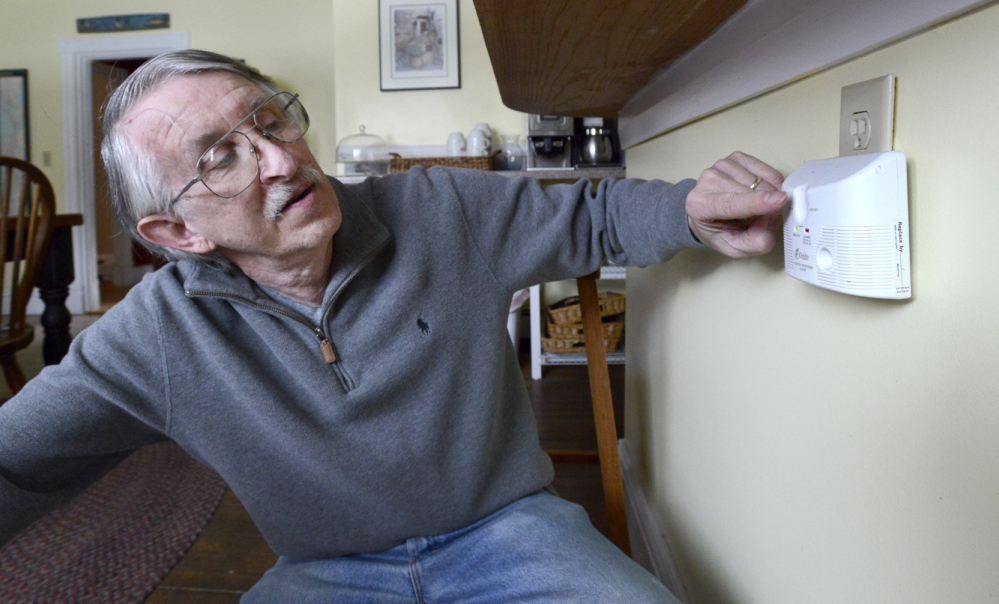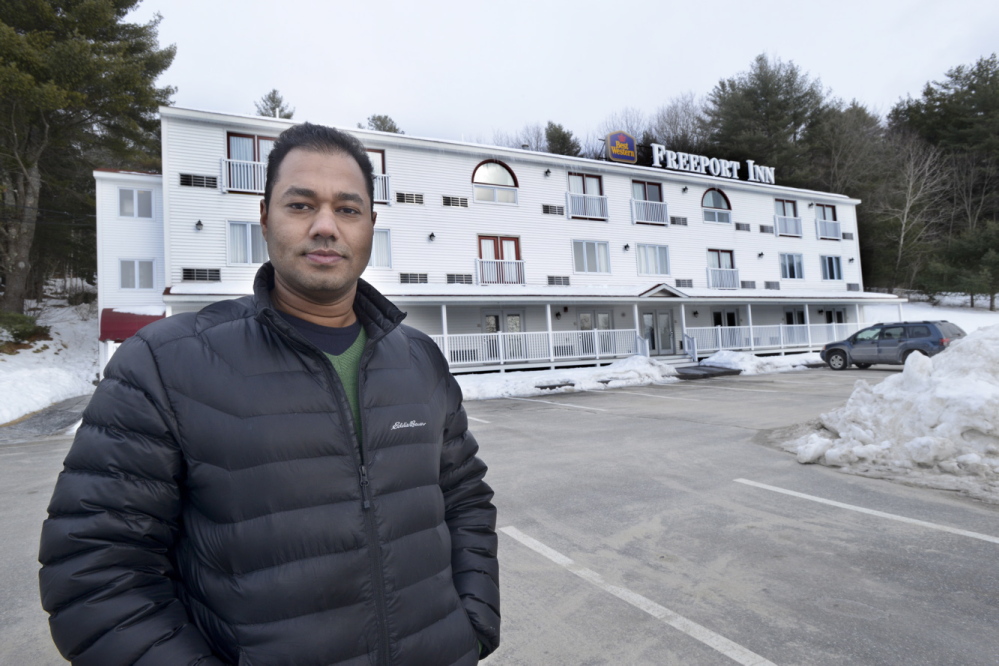The carbon monoxide poisoning of 21 people at a resort in Ogunquit on Sunday has focused attention on a state law that doesn’t require all hotels to have monitors to detect the odorless, colorless and lethal gas.
It also has prompted some hoteliers to speed up their plans to install the inexpensive detectors and promote that safety feature to guests.
The law, passed in 2009, requires carbon monoxide detectors in hotel rooms but exempts hotels built before Aug. 1, 2012, unless they have had major renovations since that date.
Advocates say there’s a good chance that law could change.
“I think we have an opportunity to do something,” said Bill Diamond, a former secretary of state and state senator from Windham who sponsored the bill in 2009. “I think people are much more tuned in to the need now, and it’s really not much more expensive. This most recent incident will be helpful.”
But a spokesman for the hospitality industry said retrofitting rooms with hard-wired detectors can be expensive, and that many hotels use electric heat and air conditioning, with no combustion to produce carbon monoxide.
“It all comes down, in my mind, to having a reasonable discussion, hopefully, on what’s the most cost-efficient way to make this happen,” said Greg Dugal, executive director of the Maine Innkeepers Association. “Hard-wiring every hotel room in the state with a carbon monoxide monitor, that would be unreasonable, in my opinion.”
Twenty-one guests at the InnSeason Resorts – The Falls at Ogunquit were sickened by carbon monoxide Sunday, and seven of them were hospitalized. The four-building complex on Route 1 did not have carbon monoxide detectors, but the resort will not face sanctions because the law requiring them took effect long after the resort was built, in 1988.
Diamond’s bill got support after a couple and their two young children, who had won a Thanksgiving stay at a condominium in Colorado, died in their sleep when a malfunctioning heater released carbon monoxide that rose two floors to the condo where they were sleeping.
The wife had a sister in Brunswick, and the extended family responded by pushing for laws in several states to require carbon monoxide detectors. Now, 25 states have some requirements for buildings to be equipped with carbon monoxide detectors.
Maine’s law requires them in all multi-family dwellings such as apartment buildings, and in all single-family homes when they are sold.
The number of Maine residents who have carbon monoxide detectors in their homes has been rising. According to the Maine Center for Disease Control and Prevention, the percentage of single-family homes with carbon monoxide detectors climbed from 35 in 2004 to 58 in 2011.
From 2007 to 2011, the latest year for which statistics are available, 576 people visited Maine emergency rooms for carbon monoxide poisoning, the CDC said.
SENATOR HAD HER OWN CLOSE CALL
State Sen. Anne Haskell, D-Portland, said it makes sense to require the detectors in more buildings.
She was a victim of carbon monoxide poisoning herself, while at a hunting camp in the 1990s. She woke up nauseous and lightheaded. The culprit was a propane refrigerator.
“It was a very close call, very frightening,” said Haskell, the Senate’s assistant majority leader. “By the time I got out of the truck (at the hospital), I couldn’t move. I had to be carried out of the truck. I could easily have not woken up.”
Carbon monoxide poisoning can feel like the flu, but without a fever, according to the Maine Department of Health and Human Services. Symptoms may include headache, dizziness, fatigue, shortness of breath, nausea, vomiting and loss of consciousness.
Haskell served on the Legislature’s Criminal Justice and Public Safety Committee in 2009, when the law passed to require carbon monoxide detectors in new and remodeled hotels. She expects the issue will be back before the Legislature, if not this year, then next.
“Change is incremental in these areas,” Haskell said. “It probably won’t cover every bed-and-breakfast and every hunting cabin in the woods, every lodging establishment in the state. I do believe it’s in the public interest and good public policy that we’ll be adding to the numbers.”
She said it makes sense to work closely with the hospitality industry to craft requirements that aren’t unnecessarily expensive or put on an overly aggressive timetable.
Sen. David Burns, R-Whiting, also served on the committee when the requirement was passed.
“The main issue at hand was the expense involved and retrofitting everything,” he said. “I thought we struck a reasonable balance at the time. Perhaps things have changed. I expect we will see a bill next session.”
He noted that the compromise requiring carbon monoxide detectors only in new and renovated hotels and dwellings was supported overwhelmingly by the committee, which included Diamond.
“It’s not good policy to base legislation on one incident,” Burns said.
INSTALLING DETECTORS NOT SO SIMPLE
Dugal, with the Maine Innkeepers Association, said installing detectors in hotels is rarely as simple as paying the typical $20 to $35 for a battery-powered or plug-in carbon monoxide detector. The monitors must be wired in, which requires electrical work, and the retrofits may require interior renovations.
When the requirement was proposed in 2009, Dugal said, he received an estimated cost of $1,000 per room, a significant expense for a large hotel.
Plug-in models could save money, but any future law would have to specify that they are allowed, he said, or insurance companies could require the more costly hard-wired detectors.
Some hotels are already installing detectors on their own. The Freeport Inn has had carbon monoxide detectors for a long time, said Seanu Anne, the inn’s manager.
Tim Rudolph, who owns the Kendall Tavern Inn, a bed-and-breakfast in Freeport, said he and his wife bought a plug-in model for about $50 several years ago. They keep it in their kitchen, above the furnace in the basement.
“You don’t even see it,” Rudolph said. “You test it once a year and make sure it works fine.”
Gary Latulippe said he has been installing combination smoke- and carbon-monoxide detectors as he has renovated the rooms at Studio East, his 30-room hotel in Ogunquit. It adds $10 to $15 to the cost of each unit, but it’s a small price to give his guests peace of mind, he said. He said half to three-quarters of the rooms now have the detectors.
“I thought it was basically a no-brainer for me to put in the dual unit because I have to have a smoke detector anyways,” he said.
After Sunday’s incident, he’s considering replacing all of his detectors with combination units. And he plans to send out a note telling guests about the new safety feature.
“As an owner and operator of a motel, your first concern always is people’s well-being and safety,” he said. “You don’t know what’s behind the next wall when you’re at a motel.”
David Hench can be contacted at 791-6327 or at:
dhench@pressherald.com
Copy the Story LinkSend questions/comments to the editors.




Success. Please wait for the page to reload. If the page does not reload within 5 seconds, please refresh the page.
Enter your email and password to access comments.
Hi, to comment on stories you must . This profile is in addition to your subscription and website login.
Already have a commenting profile? .
Invalid username/password.
Please check your email to confirm and complete your registration.
Only subscribers are eligible to post comments. Please subscribe or login first for digital access. Here’s why.
Use the form below to reset your password. When you've submitted your account email, we will send an email with a reset code.